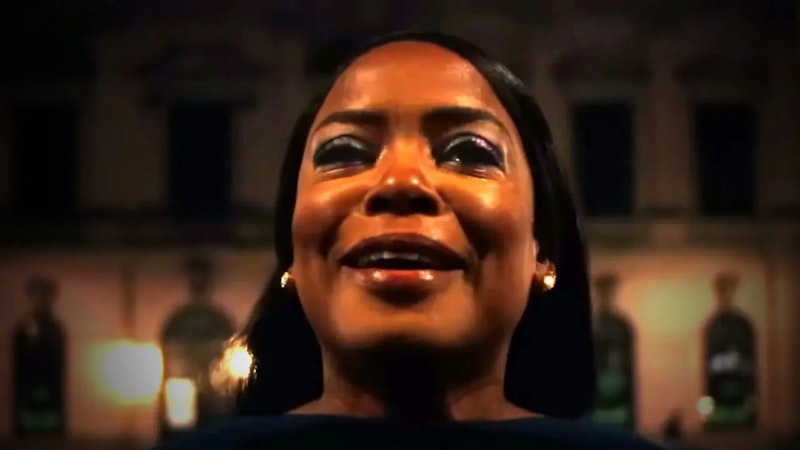Oprah Winfrey, for Black History Month, offers two movies: the musical remake of The Color Purple, the 1985 Spielberg/Winfrey movie based on Alice Walker’s 1982 novel and Origin, from Isabel Wilkerson’s 2020 book Caste: The Origins of our Discontents, which won a Pulitzer and was also a selection of Oprah’s book club.
Both movies, and perhaps the books from which they’re derived, “de center” African-Americans, racism, and white supremacy from the progressive narrative, perhaps without intending to do so.
In The Color Purple the chief oppressors are men, who rape and beat the women around them and then steal their children and sell them off to others. Only when the movie is two-thirds over does a white oppressor appear, and she’s perhaps not so much white as a member of the government ruling class, a mayor’s wife who won’t take no for an answer when she offers a black woman employment as a maid and the offer’s refused.
Origin is an intellectual history, the story of the birth of an idea, or at least the impression the idea leaves on one person, Isabel Wilkerson, who grasps it. Wilkerson, who wrote a book a decade earlier on the Great Migration, The Warmth of Other Suns, about African-Americans escaping a feudal south for industrial capitalism in northern and western cities, in Caste comes to the realization that people are oppressed, even wiped out by genocidal regimes, all over the earth, from Jews in Europe to untouchables in India, when the racial or ethnic differences between subjugators and subjugated involves either no or much lesser differences in pigmentation. (In this she differs from some black supremacist writers, like the late psychiatrist Frances Cress-Welsing, who reclassified Jews as bi-racial and partly black so she could subsume all oppression under white supremacy and claim that white people have the lowest IQs as well as being genetically inferior in every other way.)
Wilkerson is played by Aunjanue Ellis-Taylor, who may mainly share with Wilkerson truly great hair. I’m not convinced that Ellis-Taylor can portray an intellectual, though she’s sincere, as she travels to India and to Germany and to Holocaust museums and archives to study victims of oppression and genocide. The movie does offer future filmmakers (anyone want to take another crack at Atlas Shrugged?) suggestions about how to film a novel of ideas, showing the protagonist traveling to the sites of her research, from the Taj Mahal to Dachau, interviewing experts and archivists, and explaining her ideas to her childhood and non-academic friend, played by Niecy Nash, who tells her she needs to break it down so everyone can understand it. (Blair Underwood, Finn Wittrock, Connie Nielsen, Audra Macdonald and Vera Farmiga pitch in to sex up these roles as historical figures resisting Nazism, etc.)
The big idea is that there’s something deeper than race when it comes to oppression: caste. “Race is the skin, caste is the skeleton.” Somewhat tautologically caste just comes down to a powerful ruling class rules and exploits the powerless. But if it does it long enough it begins to codify its rule culturally. The rulers don’t intermarry with the ruled. The rulers don’t live near, go to school with, dine with, or socialize with, the ruled. The ruled don’t have access to the education the rulers have. The ruled are re-imagined as subhuman, smelly, dirty, rodent or insect-like. Casual violence against the ruled is allowed or not prosecuted. But this just means Wilkerson has backed in libertarian histories of the State, like D.A. Rustow’s massive study Freedom and Domination.
Excited about this film—I saw it two months before it was released in theaters—I checked out Wilkerson’s books, and began to read Caste. The result was disappointing. Wilkerson—a onetime Washington Post op-ed writer and itinerant journalism professor—discusses how Trump voters represent white people asserting their dominance over non-whites. Perhaps Wilkerson is writing what she needs to for the caste above her that provides her with employment.
She seems clueless that the Trump voters (including black men and Hispanics) are blue-collar and small business people who believe they’re being eradicated by a corporate and governing class that calls them names, smears them, posts dating ads refusing to date them, denies them access to educational credentials (rationing education by race and price and federal student loan formulae) and denies them access to careers unless they have the approved politics and educational credentials. She doesn’t see Trump voters as a suppressed caste in revolt.
But that’s what they are. Their revolt is part of what slowly created individual rights and liberties in Europe—the Peasant's Revolt, the Glorious Revolution—until the Magna Carta and then the Bill of Rights were written and then Europeans (and others) slowly began to wipe out slavery, which still exists in Africa, just without as big an international market for those enslaved.

